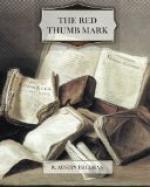At the top of Middle Temple Lane we parted, Thorndyke taking his way with fluttering gown towards the Law Courts, while I directed my steps westward towards Adam Street, the chosen haunt of the medical agent.
The soft-voiced bell of the Temple clock was telling out the hour of seven in muffled accents (as though it apologised for breaking the studious silence) as I emerged from the archway of Mitre Court and turned into King’s Bench Walk.
The paved footway was empty save for a single figure, pacing slowly before the doorway of number 6A, in which, though the wig had now given place to a felt hat and the gown to a jacket, I had no difficulty in recognising my friend.
“Punctual to the moment, as of old,” said he, meeting me half-way. “What a blessed virtue is punctuality, even in small things. I have just been taking the air in Fountain Court, and will now introduce you to my chambers. Here is my humble retreat.”
We passed in through the common entrance and ascended the stone stairs to the first floor, where we were confronted by a massive door, above which my friend’s name was written in white letters. “Rather a forbidding exterior,” remarked Thorndyke, as he inserted the latchkey, “but it is homely enough inside.”
The heavy door swung outwards and disclosed a baize-covered inner door, which Thorndyke pushed open and held for me to pass in.
“You will find my chambers an odd mixture,” said Thorndyke, “for they combine the attractions of an office, a museum, a laboratory and a workshop.”
“And a restaurant,” added a small, elderly man, who was decanting a bottle of claret by means of a glass syphon: “you forgot that, sir.”
“Yes, I forgot that, Polton,” said Thorndyke, “but I see you have not.” He glanced towards a small table that had been placed near the fire and set out with the requisites for our meal.
“Tell me,” said Thorndyke, as we made the initial onslaught on the products of Polton’s culinary experiments, “what has been happening to you since you left the hospital six years ago?”
“My story is soon told,” I answered, somewhat bitterly. “It is not an uncommon one. My funds ran out, as you know, rather unexpectedly. When I had paid my examination and registration fees the coffer was absolutely empty, and though, no doubt, a medical diploma contains—to use Johnson’s phrase—the potentiality of wealth beyond the dreams of avarice, there is a vast difference in practice between the potential and the actual. I have, in fact, been earning a subsistence, sometimes as an assistant, sometimes as a locum tenens. Just now I’ve got no work to do, and so have entered my name on Turcival’s list of eligibles.”
Thorndyke pursed up his lips and frowned.
“It’s a wicked shame, Jervis,” said he presently, “that a man of your abilities and scientific acquirements should be frittering away his time on odd jobs like some half-qualified wastrel.”




